Cool Pic Archive Pages
| 1 |
2 | 3 |
4 | 5
| 6 | 7
| 8 | 9
| 10 | 11
| 12 | 13
| 14 | 15
| 16 | 17
| 18 | 19
| 20 | 21
| 22 | 23
| 24 | 25
| 26 | 27
| 28 | 29
| 30 |
These images have been chosen for their uniqueness. Subject matter ranges from
historic events, to really cool phenomena in science and engineering, to relevant
place, to ingenious contraptions, to interesting products (which now has its own
dedicated Featured Product
category).
  Update: Thanks to J.C. for providing three more
of the Varian Associates radar comics - that's a total of twenty thus far. The original
text on these is in German poem form, so the Google translations have lost some
context. Fortunately J.C., a German who lives in Germany, provided a translation
in modern lingo. Update: Thanks to J.C. for providing three more
of the Varian Associates radar comics - that's a total of twenty thus far. The original
text on these is in German poem form, so the Google translations have lost some
context. Fortunately J.C., a German who lives in Germany, provided a translation
in modern lingo.
A few years ago another frequent RF Cafe visitor who goes by the moniker "Unknown
Engineer" sent me a hyperlink to a PDF file on Amazon's CloudFront* content delivery
network (CDN - basically a file server) that contains no fewer than 17 amazing
radar and vacuum
tube related line drawings published by Varian Associates' TWT Division, Palo
Alto Tube Division, Solid State Division, Eastern Tube Division, Western Tube Division,
Solid State West Division. These highly detailed and busy drawings were done around
1975 by British illustrator/artist C.E.B. Bernard; a search for his works did not
reveal much. The events shown are fictitious, as are the accompanying hand-printed
stories. Some of the puns are pretty clever, but are somewhat dated for today's
readers. To wit, the name Memamadun Ptolemy, which for the uninitiated is an allusion
to the movie "Blues in
the Night," where the actual words are "My momma done 'tol me..." (get it?).
Another worthy mention is, "Tube V or not Tube V, that is the question," an obvious
play on Shakespeare's "To be or not to be, that is the question" line by Prince
Hamlet. If you recognize
those, you'll find other familiar takeoffs as well. The original drawings are evidently
at the Sanford Universities
Library and can be viewed by appointment only.
Varian Associates
was founded in 1948 by engineer brothers
Russell H. and
Sigurd F. Varian**, along with a handful of directors, to market their klystron
and magnetron tubes (among other products).
* I had the
Archive.org website grab a copy for posterity sake, in case the original goes
away some day. My guess is this is copyrighted material and is posted without permission
on that CloudFront server, so I have not stored a copy of it.
** See the December 1961 issue of Radio-Electronics for the death notice
of
Sigurd Varian, who met his demise in an airplane crash.
 Hannibal Crosses the Alps, 218 B.C. Hannibal Crosses the Alps, 218 B.C.
Der Hannibal war schwer vergällt
und wollt' das Radarteam verprügeln:
weil man den Azimuth verstellt
ging's nicht auf Pässen, sondern Hügeln.
Viel Kummer haben Elefanten,
versagt's Radar in fremden Landen.
Google Translation:
The Hannibal was badly denatured
and wanted to beat up the radar team:
because you adjust the azimuth
It wasn't on passes, but on hills.
Elephants
have a lot of grief
radar fails in foreign lands.
J.C. Translation:
Pissed of was Hannibal and wanted to beat the RADAR Team, because the azimuth
was of misaligned and didn’t work on (mountain) passes, only hills. Much sorrow
had the Elephants, if RADAR fails in strange lands.
 Castle of Götz von Berlichingen, A.D. 1550 Castle of Götz von Berlichingen, A.D. 1550
Einst wollt' der bose Feind bezwingen
die Burg des Götz von Berlichingen.
Da reißt im Radar jah ein Draht!
Der Götz brüllt sein bekannt' Zitat:
"Ihr könnt mich kreuzweis', seht es ein,
das Radar sollt' in Ordnung sein!"
Google Translation:
Once the evil enemy wanted to defeat
the castle of Götz von Berlichingen.
A wire breaks in the radar!
The Götz roars his famous quote:
"You can cross
me, see it,
The radar should be fine!"
J.C. Translation:
Once an enemy wanted to conquer
the castle from Götz von Berlichingen
Suddenly a wire snaps in the RADAR
And Götz shouts his famous quote
you can kiss my behind
The RADAR should be working.
*1: The Quote you will find for Götz von Berlichingen is
”er kann mich im Arsche lecken” or “he can lick me in my ass”
 Düppel on the Schanz, 1864 A.D. Düppel on the Schanz, 1864 A.D.
Einst zu Düppel auf der Schanz'
gab es manchen harten Tanz.
Mit Zielradar
ging's and den Feind,
der keinen Tod zu fürchten scheint.
Und Radar steuert
bei zum Sieg;
drum braucht man's heute noch im Krieg!
Google Translation:
Once at Düppel*1 on the Schanz'
there was some hard dancing.
With target radar we went to the enemy,
who doesn't seem to fear death.
And
Radar contributes to the victory;
That's why you still need it in war today!
*1: Düppel appears to translate as "chaffe" which relates
to radar countermeasures.
J.C. Translation:
Once at Chaff on the redoubt*1
There were hard dances*2
With illumination RADAR the enemy was faced*3 .
Who didn’t fear death.
And RADAR contributes to the win.
And therefore needed for the war.
*1: earth wall, *2: fights, *3: I would translate
Ziel-Radar with illumination of a target, to follow a detected target once it has
been been detected.
 The Birth of Radar The Birth of Radar
According to an old Croatian fable, the first experimental radar station was
installed 102,000 years ago last Thursday by a tribe of Cro-Magnons. But no sooner
had the station been erected than a dinosaur appeared on the scene and gulped down
everyone in sight - everyone but one badly frightened survivor.
"Tell the truth, man," the dinosaur said, "or I'll make Filet Cro-Magnon out
of you. What is this mess of bones and stones you have here?"
"Ra-ra-radar," was the weak reply.
"Tell me another one," the dinosaur snorted. If this is radar, I'm a ringtailed
brontosaurus. Does it have Varian magnetrons?"
"No ... but ..."
"That does it," the dinosaur said. "Whoever heard of a radar set without Varian
magnetrons?"
 The Day Somebody Goofed The Day Somebody Goofed
On April 7, 45 B.C., during the reign of Cleopatra, Memamadun Ptolemy (pronounced
me-ma-ma-done-toll-me), radar operator, fell asleep at just the time chosen by some
unfriendly neighbors to make a border raid.
Memamadun (he was the only survivor) was brought before Cleopatra.
"Can you give me any reason why I shouldn't throw you to my pet crocodile Julius
for letting such a terrible thing happen?" she asked.
Memamadun stifled a yawn.
"Even if I'd been awake, our radar wouldn't have prevented the attack," he said.
"Our radar won't work."
Why not?" the queen asked, stroking Julius' head.
"It can't," Ptolemy told her. For one thing, Varian solid state oscillators*
haven't been invented yet."
"That's right, too!" Cleopatra said. "Case dismissed."
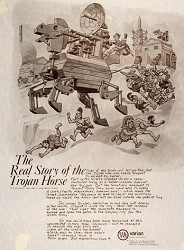 The Real Story of the Trojan Horse The Real Story of the Trojan Horse
None of the books will tell you this, but the Trojan War was really brought to
an end by radar.
Fact is the Greeks intended to use a radar-controlled horse as a super-weapon
against the Trojans. But the scientists assigned to Project Phony Pony never were
able to make it work (faulty magnetrons, someone said) - which made the Greek commander
Odysseus so mad he ad all the scientists sealed up inside the horse and left for
dead outside the gates of Troy.
The curious Trojans, neglecting to look this gift hearse in the mouth, dragged
it inside the city - their last mistake of the war. That night the scientists managed
to escape and open the gates to the sleeping city for the Greek Army.
No one could have been more surprise at this unexpected victory tan Odysseus
- but he managed to squelch the real story and claim all the credit for himself.
Which goes to show that people haven't changed much in 3500 years. But magnetrons
have.*
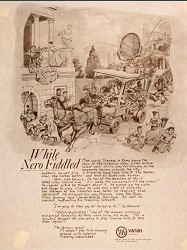 While Nero Fiddled While Nero Fiddled
One windy Tuesday in Rome during the reign of the infamous Nero, a new mobile
radar unit, on its way for delivery to the emperor's legion outside the city, suddenly
caught fire. A traveling wave tube blew,* the sparks flew, the horses bolted, and
soon all Rome was ablaze.
Nero was furious. He had all the members of the ill fated crew before him. "I'll
make the punishment fit the crime!" he roared. While he thought about it, he picked
up his violin and began to play. Since he was the vilest of violinists, the feeling
of his listeners may better be imagined than described. He scraped his way through
'Keep the Rome Fires Burning' and 'Smoke Get In Your Eyes.' At last he paused, confronting
his trembling listeners.
I'm going to have you all boiled in oil!" he boomed.
"Thank Goodness!" one of the doomed wretches exclaimed fervently as they were
being led away. "For a minute I thought he was going to play 'Smoke Gets In Your
Eyes' again!"
The obvious moral:
It doesn't pay to go horsing around with inferior traveling wave tubes.
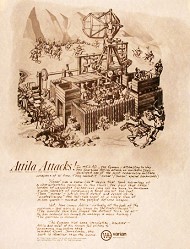 Attila Attacks Attila Attacks
In 452 AD., the Romans - attempting to stop he fearsome Attila' attack on northern
Italy - developed one of te most remarkable military weapons of all time. They called
it "nosar" ("sonar" spelled backwards).
"Nosar was a radar-like* device that took advantage of a characteristic peculiar
to the Huns: the fact that these hordes of unwashed barbarians gave off an aura
so awesome it was capable of paralyzing a small dog at 300 feet. Thus "nosar" -
which could detect and record on its "nostrilliscope" the tell-tale scent of a single
Hun at 10,000 yards - seemed the perfect defense weapon.
Yet, here comes Attila - virtually at the gate of the garrison - and nary a pip
shows on the "nostrilloscope!" The horrible Hun has played the dirtiest trick of
all - he has ordered his troops to undergo a mas bathing! The garrison is doomed.
The Romans had some consolation, however - Attila and most of his troops fell
victims to pneumonia long before they reached Rome. Sometimes, the bath is deadlier
than the sword.
 A Viking Fable A Viking Fable
When the terrible green monster suddenly appeared alongside the good ship Viking
Queen, all hands save one disappeared over the side into the chill waters of the
North Atlantic. Only Lief Smorgasbord, radar operator, remained aboard to face the
beast.
If we may take a trembling Lief from history, we will follow the conversation
that ensued:
Lief (trembling): Why ... Why didn't you show up on my scope?
Monster (in a high, feminine voice): I'm enchanted, that's why! Oh, Mr. Viking,
I'm just a poor princess who has been bewitched and transformed into a teen-age
she-sea serpent! If you could answer the Mysterious Riddle you could break the spell
and marry me.
Lief (still trembling): The Mysterious Riddle?
Monster (hopefully): t goes like this.
Heart of that which has no ears, but hears;
No eyes, but sees; no nose, but knows...
Tube V or not Tube V, that is the question!
Lief managed to answer the riddle, breaking the spell and instantly transforming
the monster into a lovely princess. And so they were married and lived happily ever
after. *
* The answer was "Varian" of course. Lief knew "Tube V or not Tube V must refer
to Varian tubes, heart of any radar system ("that which has no ears, but hears,
etc.") Smart one that Smorgasbord.
 Radar and the Crusades Radar and the Crusades
The scene: England at the time of the third Crusade. The date: Tuesday, August
8, 1189. After years of secret preparation, the first radar installations intended
for use in the Near East campaign were ready at last to begin their long sea journey.
All England was agog with hope and excitement. The newspapers sent their best men
to Stoke Poges-on-the-Chutney to cover the story.
The equipment was a towering monument to medieval genius - an achievement of
the first water, so to speak. Mountains of stout English oak encased components
marvelously wrought of myrrh, dried bats wings, and the bones of sheep born on Thursday.
The tubes were of stained glass, with fireflies inside to make them glow. Unfortunately,
however, since this was long before ht days of solid state diodes and miniaturization*,
the installations were cumbersome as waltzing elephants and heavier than Dr. Jekyll's
conscience. As a result, the ship went down faster than you can say "man overboard"
-even before loading was complete.
The nation's press reflected the disappointment felt throughout the land. Headlined
the august London Times:
"Crusader Radar No Cruise Aider."
Commented Stoke Poges Confidential:
"Confidentially, It Sinks."
* as for example, in modern solid state microwave devices like those mad by a
company which shall be nameless - called Varian.
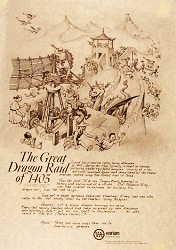 The Great Dragon Raid of 1405 The Great Dragon Raid of 1405
Legend has it that one balmy spring afternoon in 1405, during the Ming Dynasty,
a flight of terrain following radar equipped dragons, cruising at a low altitude,
swooped down and demolished all the radar stations posted along the Great Wall of
China.
Thus the first DEW line (Dragon Early Warning) in history was pulverized at a
stroke. But Emperor Ming, who had spared no expense at building his dragon-net,
had the last laugh.
True not a single antenna remained standing. Every last one was eaten to the
last savory shoot by the bamboo-loving dragons.
However, not a single dragon survived his meal. Every last savory bamboo shoot
had been poisoned by the Emperor, who obviously didn't put all his trust in electronics
... as who would in 145 B.V. (Before Varian)?*
Moral: here are more ways than one to bamboozle dragons.
 How Radar Got Its Name How Radar Got Its Name
Before Columbus, radar had no name. It was called "The thing with no name."
Aboard the Santa Maria, however, "the thing with no name" behaved in a most startling
manner. No matter which way the antenna was pointed, the scope, like a rear view
mirror, showed only where the ship had been - not where it was going. This phenomenon
was most unnerving to all hands, since it necessitated the ships going backwards
much of the time.... a condition that gave rise, among other things, to a
peculiar kind of mariner's nausea that came to be known as "throwing down."
So it is hardly surprising that on the morning of October 12, 1492, Columbus
found himself on the rocks at San Salvador. Once on land, the crew re-christened
the thing with no name and called it "radar" - the thing that looks the same way
coming or going.
A few days later, the radar operator discovered the trouble: the 'klystrons'
had been inserted upside down. Columbus was so grateful he bestowed upon him the
Order of Nairav Snortsylk ... which of course is Varian Klystrons spelled backwards.
 The Perfidious Electron Tube The Perfidious Electron Tube
Languishing in his cell after his defeat byCortez, the Aztec emperor Monteuma
filled out his lonely hours by penning one of the most remarkable war memeoirs of
all time.
It was called, strangely enough, "The Perfidious Electron Tube." Only recently
discovered after having been lost fo centuries, it throws new light on one of the
key events in New World history.
In it, Montezuma sums up his defeat in one word: "Skaflanggz." For those of you
whose Aztec isn't what it might be, the word means "radar."* (And for those of you
who may feel a commerical coming on, you just may have something there. But honest,
that's what hte man said.)
As Monty saw it, his radar tubes zigged when they should have zagged. Today,
more sophisticated electronics people would simply say the radar was unable to obtain
a fix on moving targets. Monty simply had obsolete magnetrons. But he truth is clear.
A few Varian coaxial magnetrons in the right place might have changed history. Your
children might now be studying Aztec in school instead of Spanish! You yourself
might be eating Aztec omelets - or wearing feathers for trousers.
Come to think of it, maybe it's better things turned out the way they did. *
 Sir Francis Drake Cracks a Case Sir Francis Drake Cracks a Case
One foggy day in 1588, a single ship of the Spanish Armada managed to sneak behind
Drake's entire British fleet lying in the English Channel off Plymouth Hoe, and
drop a 10 pounder smack in the middle of a bowling match between Sir Francis and
his Friend Walter Raleigh.
The new radar was caught completely by surprise. Had the IFF (Identification:
Francis or Foe?) system failed? Was the operator tuned to the wrong channel? Was
there something wrong with the tubes? Drake was determined to find out. He was inside
the shack in a trice, whatever that is. "Avast" he roared at the radarman, "I must
inspect those tubes!"
Drake picked up a magnetron and looked at it. "Aha!" he exclaimed. "Just as my
razor-keen mind suspected!" With that he seized the hapless operator and shook him
by the throat like a tumblerful of sidecars. "I arrest you for stealing our magnetrons*
and substituting these inferior substitutes, William Shakespeare!"
"I confess, how'd you guess?" said Shakespeare, ever the poet.
"Elementary for a razor-keen mind like mine," answered Drake. "Only you could
have conceived the cunning scheme of replacing Varian magnetrons with factory seconds
labeled "Bethmat" as a publicity stunt for your new play - Macbeth!"
"Yours is a razor-keen mind indeed!" marveled Shakespeare as they led him away,
"I haven't written Macbeth yet!"
"Plenty of time where you're going, " Drake said - and went off to bowl over
the Armada.
 Galileo Meets the Martians Galileo Meets the Martians
One memorable day in 1633, 5 space ships suddenly materialized in the sunny Italian
skies over Pisa and landed directly under the nose of Galileo's telescope. Three
creatures alighted from the lead ship and made straight for Galileo.
"Good morning Signor Galileo," the chorused in unison. "We are ... "
"Don't tell me, let me guess," interrupted the scientist. "The Mars Brothers?"
"In the flesh, more or less," leered the green one in the middle, brandishing
a cigar. "I'm Slucho. Sorry about the accident. We seem to have knocked off a Pisa
the Tower."
"Good for the tourist trade," Galileo smiled.
"Now for business," went on Soucho. "The boys upstairs are fascinated with your
radar.* They sent us down here to find out how you make it work without
Varian power klystrons."
"I'm sorry to say it doesn't work at all," Galileo answered. "Or rather - it
didn't until the instant your ship hit the tower."
Sloucho's cigar was aquiver with excitement. "What happened then?" he asked.
"See for yourself," Galileo said pointing a bony finger at the radar console.
There, blinking crazily, ike so many overstimulated lightning bugs, the tubes were
actually spelling out a single word.
The word was "TILT."
 Shaggy Fish Story Shaggy Fish Story
At the height of the Boston TWTea Party, while the "Indians" were busy throwing
everything in sight over the side, the British radar operator suddenly found himself
pitched overboard. Since he couldn't swim, he clung precariously to a wooden tea
case bobbing in the water, and floating aimlessly around, thrashing wildly and yelling
for Help. Just as he was about to lose his grip on his precious raft, a codfish
surfaced nearby.
"What's going on here?" the codfish asked.
"Some wild Indians surprised our radar, overran the ship, and threw all the tea
overboard," the radar man gasped.
"Well, the codfish said, "Bet you a fin you didn't have an Varian TWT's* in that
radar of yours!"
"Good cod, here I am drowning in front of your eyes and you have to give me a
commercial," the main said. "I can't hang on much longer."
The fish ignored him "... Anybody knows Varian makes the finest TWT's and TWTA's
either side of the Boston Harbor," he said.
"Look," the man said. "I've just about haddock. But tell me this: How do you
know so much about microwaves?"
"I'm no expert," the codfish said. "I just dabble in it for the hallibut."
"O," the main said. And he sank slowly into the sea.
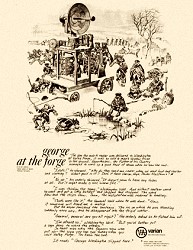 George at the Forge George at the Forge
The day the mobile radar was delivered to Washington at Valley Forge, it was
so cold a man's shadow froze to the ground. Nevertheless, the Father of his Country
managed to work up a good head of steam when he saw the unit.
"Idiots!" he stormed. "Why do they send me radar when we need food and shelter
and clothing? What good is it? Does it have Varian High Power Klystrons?*
"No sir," his orderly shivered, "It doesn't seem to have any tubes at all. But
it might make a nice warm fire.
"I was thinking the same," Washington said. And without another word he wet and
got a little hatchet and chopped and chopped. The wind blew and the chips flew.
Soon, the installation was reduced to kindling.
"That's more like it," the General said when he was done. "Now, if someone will
hand me a match ...
But he never finished the sentence. The ice on which he was standing suddenly
gave way, and he disappeared into the frigid water.
"General, general, are you all right?" the orderly asked as he fished him out.
"I'm afraid so," Washington said. "But you'd better put a sign here to warn the
others.
So that was why the famous sign was put up - the sign you can see today when
you visit Valley Forge. You know the one.
It reads "George Washington slipped here."
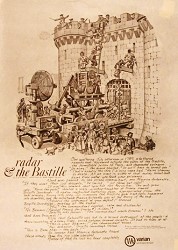 Radar and the Bastille Radar and the Bastille
One sweltering July afternoon in 1789, a tattered raggedy mob appeared outside
the gates of the bastille, the formidable prison of Paris, and demanded entrance.
"Go away," the guard shouted," or we'll have to arrest you."
"That's exactly the idea!" a voice came back. "We're starving to death. All we
want is a little of that moldy bread and Seine River water you feed your prisoners.
Word was passed to the prison commandant, one Maurice Antoinette. "If they want
their just desserts," he smiled, "let them eat cake!"
It was this remark that sparked the Revolution. The mob grew ugly. "Force the
gate!" shouted a sickle-wielding daughter of France named Brigitte Sourdough. A
radar controlled battering ram, appropriated from the local armory, swung into play.
In moments the Bastille gate had been hammered into shambles, and the unfortunate
Maurice Antoinette was at the mercy of the mob.
"Observe the instrument of your defeat!" sneered Brigitte Sourdough, pointing
at the radar.
"Pfui,"the commandant replied, calm and disdainful.
"No Beaumac (Ancient French for Varian*) diodes!"
Brigitte was furious. "The commandant wants Beaumac? He shall have Beaumac!"
With that Antoinette was let to a second instrument of the people - a device
consisting of a heavy blade, poised between grooved uprights. It had no tubes at
all.
"This is your Beaumac?" the commandant asked.
"Oui, monsieur, " Brigitte Sourdough leered.
"This is Beau Mac - the knife!"
No sooner had Maurice Antoinette heard these words than his icy calm vanished.
Matter of fact, he lost his head completely.
 About Waterloo About Waterloo
Shortly after Waterloo, the Duke of Wellington received a letter, postmarked
St. Helena. It was from Napoleon. It read: "Excellency: I was amused to hear your
recent remark that 'The Battle of Waterloo' was won on the playing fields of Eton!
To have won an engagement in Belgium from a field in England, you must have been
further back of the battle line than I thought."
The reasons for my defeat were two, and Eton was neither. In the first place,
the radar broke down for two hours in the heat of battle. Not even a Napoleon can
be expected to make radar work without Varian TWT's.*
"But I might easily have defeated you, faulty tubes and all, had I not been persuaded
to partake of a bottle of Scotch on the evening before the battle. I have reason
to suspect my drink was tainted. At any rate, on the day of Waterloo, I did not
display my usual energy and decisiveness.
"It appears, in short, that you owe the battle to the bottle. (signed, N.)"
The Emperor received a brief reply by return boat. It read: "Excellency: In view
of the fact that your loss at Waterloo appears to have been less a matter of Eton
than of Drinking, I am withdrawing my original statement. I have released the following
in its place, which I here submit for your approval:
'You can mix Scotch and Water
And Water and Scotch
But don't whatever you do
Make the mistake Napoleon did,
And mix Scotch and Waterloo.'
(signed,) Wellington
 Tall Tale from Texas Tall Tale from Texas
A few years after the Battle of the Alamo, a Texan was showing a friend from
Oklahoma around the famed battle site.
Everything was preserved just as it had been on the historic da. The donkey was
plodding patiently on his treadmill, making the great radar antenna turn round and
round.
"What's that?" the man from Oklahoma asked.
"Why anybody knows what that is!" the Texan said. "That's radar.* Invented right
here in Texas. It can see in the dark, this radar can. You can't make a move without
its knowing it, no matter if you're two miles away.
"If that's what radar is some ass on a treadmill, goin' nowhere ... for something
that can see in the dark and you can't get away from- we've had them in Oklahoma
for years."
"You've had radar for years?"
"Sure," the Oklahoman said. "Only we call'em husbands and wives. "
Posted December 15, 2023
(updated from original
post on 8/14/2020)
|




 Update: Thanks to J.C. for providing three more
of the Varian Associates radar comics - that's a total of twenty thus far. The original
text on these is in German poem form, so the Google translations have lost some
context. Fortunately J.C., a German who lives in Germany, provided a translation
in modern lingo.
Update: Thanks to J.C. for providing three more
of the Varian Associates radar comics - that's a total of twenty thus far. The original
text on these is in German poem form, so the Google translations have lost some
context. Fortunately J.C., a German who lives in Germany, provided a translation
in modern lingo. Hannibal Crosses the Alps, 218 B.C.
Hannibal Crosses the Alps, 218 B.C. Castle of Götz von Berlichingen, A.D. 1550
Castle of Götz von Berlichingen, A.D. 1550 Düppel on the Schanz, 1864 A.D.
Düppel on the Schanz, 1864 A.D. The Birth of Radar
The Birth of Radar The Day Somebody Goofed
The Day Somebody Goofed The Real Story of the Trojan Horse
The Real Story of the Trojan Horse
 While Nero Fiddled
While Nero Fiddled  Attila Attacks
Attila Attacks  A Viking Fable
A Viking Fable  Radar and the Crusades
Radar and the Crusades  The Great Dragon Raid of 1405
The Great Dragon Raid of 1405  How Radar Got Its Name
How Radar Got Its Name  The Perfidious Electron Tube
The Perfidious Electron Tube  Sir Francis Drake Cracks a Case
Sir Francis Drake Cracks a Case
 Galileo Meets the Martians
Galileo Meets the Martians  Shaggy Fish Story
Shaggy Fish Story  George at the Forge
George at the Forge  Radar and the Bastille
Radar and the Bastille  About Waterloo
About Waterloo  Tall Tale from Texas
Tall Tale from Texas 

